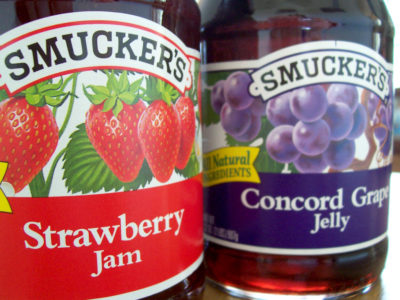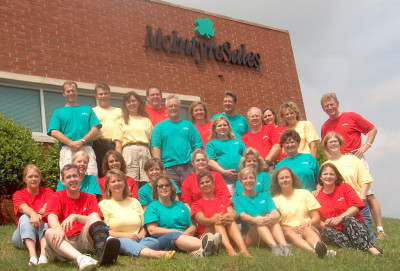
“Never allow a person to tell you no who doesn’t have the power to say yes.” – Eleanor Roosevelt
I was late getting the news. Back then my flip phone was not lit up all day, like our present screens. We were on vacation when word finally reached me of a major Client interviewing for representation in our Carolina market.
Smucker’s would be the ideal fit for us. They offered branded, high quality products that matched up with our existing businesses. But when I finally got the Region Manager on the phone, he told me he would only be in Charlotte for one day and his interview schedule was already full. Sorry.
I thanked him for taking my call and hung up the phone from our Phoenix hotel room. That call put a damper on our trip, for sure.
At dinner, Joyce knew something was wrong. “Who did you talk to?” she asked. I explained the story, along with the background. Later that evening, my thoughts started to come together. I was not going to accept his NO answer. Period.
Eleanor Roosevelt was right, the Region Manager didn’t have the final power to say yes in hiring us, so I wasn’t going to give him the final power to say no to an interview.
Since I knew it would be useless to call back and argue, only making him dig in further, I needed to find a way to get him to think interviewing McIntyreSales was his idea!
 Compiling a list of agencies from around the country who represented Smucker’s was my starting point. I knew many from my years of manufacturer’s advisory councils and other industry events. My phone calls with them were encouraging. The plan was for my friends to contact Smucker’s upper management, and, in the course of conversation, mention that while interviewing in the Carolinas they would, no doubt, be seeing the good folks at McIntyre. My colleagues were to talk about how well McIntyreSales would fit in with the Smucker’s family, but never say a word about the Region Manager closing the door on our interview.
Compiling a list of agencies from around the country who represented Smucker’s was my starting point. I knew many from my years of manufacturer’s advisory councils and other industry events. My phone calls with them were encouraging. The plan was for my friends to contact Smucker’s upper management, and, in the course of conversation, mention that while interviewing in the Carolinas they would, no doubt, be seeing the good folks at McIntyre. My colleagues were to talk about how well McIntyreSales would fit in with the Smucker’s family, but never say a word about the Region Manager closing the door on our interview.
It worked. In a few days, the Region Manager called to suggest that if we still wanted to interview, he could fit us in at the close of the day. We would be last, but that was his best offer.
Perfect. McIntyreSales would leave the final impression in their minds, and we would have the opportunity to ask an important question: “Was there anything impressive in your other interviews today, with our competition, that we failed to cover?”
That simple question is often the best at bringing everything into an open discussion.
In under two days the Region Manager called to announce McIntyreSales as the choice for Smucker’s. WE HAD NAILED IT.
Was it the tour with our handshakes, our presentation, or the recommendations from across the country? I’ll never know, but what I do know is that NO was not the final answer.
We moved the conversation to YES.
Both parties won. Smucker’s got the best representation for the Carolinas and McIntyreSales got to sell the wonderful Smucker’s products.
Tell me about times you settled for NO, or didn’t. Was that a good choice?
McIntyreSales was a sales agency, or food broker, in the Carolina foodservice industry, with a 30-year history of success. We preformed the sales function between the producer and the end-user. The end-user could be any restaurant, hotel, hospital, school or other venue serving food away from home.
Clients contracted with us for the exclusive sales rights to their products in our territory. We then sold their food to our Distributor and Operator Customers.
It is a large, but little understood, niche in our nation’s vast food system.
Do you have examples of letting the other person feel as good about the outcome as you, without an argument?
As always, the conversation starts here.
“In the ordinary choices of every day we begin to change the direction of our lives.” – Eknath Easwaran
Epilogue
Getting to YES is at the heart of any successful agreement. Negotiations should never be a zero-sum, win/loose deal but a win-win for both sides. See how you feel about Roger Fisher’s ideas.


Bruce,
Thanks for sharing your sales advice. Never say never! Great post. Reminds me of my experience in the early “Wild West” days of the Internet. Trying to secure an appointment with the big brands and then convince them to integrate their technology with ours was tough, but thrilling and relationship building. It took bravery, persistence and a collaborative team of sales/tech/lawyers/marketing to get the job done. In closing, I like the video for many reasons. Mainly, to change the conversation to a win-win.. See you soon!
Amy –
Yes, I think of this story often these days. Moving discussions to a win/win rather than a zero sum game is important to better outcomes. It sounds like you learned this sooner than most in those “Wild West” days of the Internet.
Thanks for joining the conversation.
– Bruce